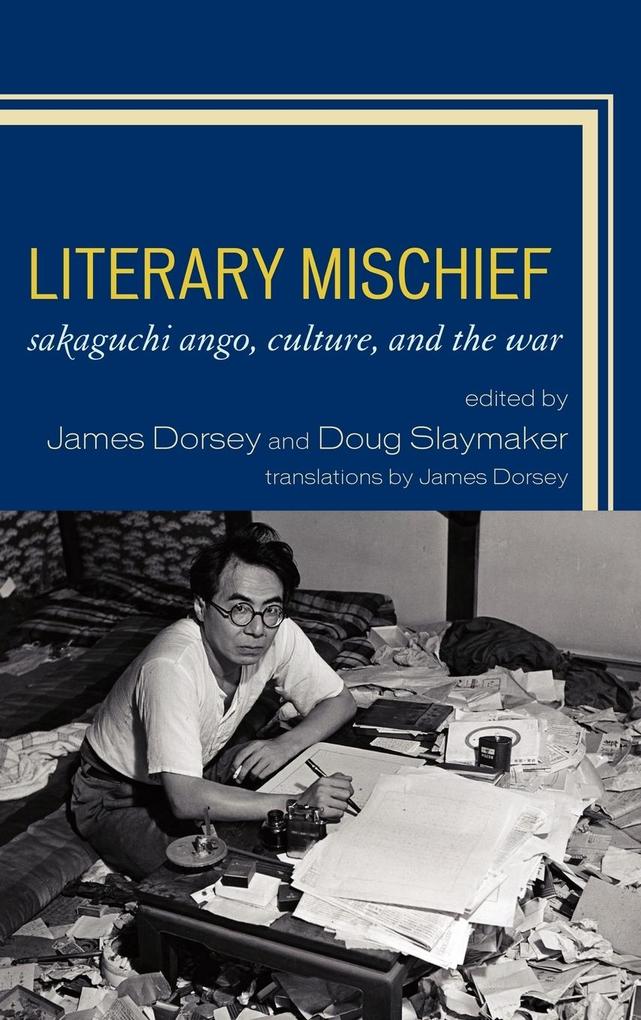
Zustellung: Do, 05.06. - Di, 10.06.
Versand in 1-2 Wochen
VersandkostenfreiBestellen & in Filiale abholen:
Literary Mischief brings renewed focus to the work of Sakaguchi Ango one of the most creative and stimulating thinkers of postwar Japan. The essays and translations included get at the heart of the most volatile issues of culture, ideology, and philosophy of postwar Japan.
Inhaltsverzeichnis
Part 1 Essays Chapter 2 1 Introduction: The Scribbler and the Sage Chapter 3 2 The Irrational Will to Reason: The Praxis of Sakaguchi Ango Chapter 4 3 Paradox at Play: Ango as Japanese Humanist Chapter 5 4 Kataru koto nashi: A Brief Tour of Ango's Native Place Chapter 6 5 Sakaguchi Ango's Individual Cult(ure) Chapter 7 6 The Art of War: Sakaguchi Ango's "Pearls" and the Nature of Literary Resistance Part 8 Translations 9 7 A Personal View of Japanese Culture (Nihon bunka shikan, 1942) 10 8 Pearls (Shinju, 1942) 11 9 Discourse on Decadence (Darakuron, 1946) 12 10 Discourse on Decadence, Part II (Zoku darakuron, 1946)
Produktdetails
Erscheinungsdatum
30. April 2010
Sprache
englisch
Seitenanzahl
214
Autor/Autorin
James Dorsey, Douglas Slaymaker
Verlag/Hersteller
Produktart
gebunden
Gewicht
505 g
Größe (L/B/H)
235/157/17 mm
ISBN
9780739138663
Entdecken Sie mehr
Pressestimmen
With its critical insights and deft translations, Literary Mischief provides a much-needed introduction to the works of Sakaguchi Ango, the most important anti-canonical author of canonical importance whose literary endeavors helped to shift the trajectory of postwar Japanese thought. -- Sari Kawana, University of Massachusetts Boston Sakaguchi Ango's insights on humanity, war, and culture have the power to move us as never before. Rising phoenix-like and irascible from the ashes of postwar Japan, Sakaguchi peeled back the shiny layers of pre-war ideology, revealing an enduring vision of the folk. With fine translations by James Dorsey and a selection of illuminating essays, Sakaguchi is riveting. -- Eve Zimmerman, Wellesley College This volume explores the historical moment and literary genius of a member of the Japanese literati who is little known in the West. Part 1 comprises five judicious essays and an introduction, in which Dorsey explicates the several representative writings by Ango (1906-55) presented in translation in part 2. Ango's penchant for iconoclasm and irreverence for things "traditional" is revealed in his "Discourse on Decadence" (1946), which earned him his literary reputation in postwar Japan. An unflinchingly honest cultural critic, Ango remained independent of political ideology throughout a historical period noted for its severe upheavals. A joyous iconoclast with an insatiable appetite for life and a fondness for farcical extremes, Ango sometimes blurred the boundaries of genre with his writing, which defies categorization in any Japanese literary school. He was considered a buraiha, "libertine," by default, and his life and works are distinguished by rebellion (against form and convention) and passion; he believed literature represented the entire human experience. This excellent book is a welcome addition to Japanese literary criticism. Highly recommended. CHOICE, November 2010 Easily one of the more fascinating writers of the twentieth century, Sakaguchi Ango refuses easy categorization. Unconventional, rebellious, and transgressive, he challenges tacit assumptions about 'Japanese-ness,' genre, and aesthetics. In Literary Mischief: Sakaguchi Ango, Culture, and the War Slaymaker and Dorsey give us an Ango dokuhon or 'reader' that aptly captures the author's complexities and brilliance. With essays from Karatani Kojin, Ogino Anna, and others, and finely-honed translations from Ango's eclectic oeuvre, Literary Mischief explores the often poignant interactions between a luminous literary mind and the broader discourses that informed this pivotal point in Japanese history. -- Rebecca Copeland, Washington University in St. Louis Homing in on the author's deliberate juxtaposition of individual and cultural identity formation Because they successfully made the case for reconsideration of Ango's oeuvre, one hopes the editors will continue with this endeavor in their ongoing research Ango's predilection for inverting or dismantling a series of binary oppositions hitherto viewed as inviolable that leaps off the pages In a carefully constructed thesis, James Dorsey goes to the heart of the debate on literary complicity Dorsey's close reading of "Shinju," read as it is through the prism of Ango's hallmark "Daraku-ron," is indeed refreshing-as is his conclusion that, for all the conflicting interpretations of the work, "all is not lost." What we have here, in short, is a long-awaited "Ango reader," a collection that will be of interest to a wide range of Japan hands and one that provides plenty of scope and ideas for further investigation Journal Of Japanese Studies
Bewertungen
0 Bewertungen
Es wurden noch keine Bewertungen abgegeben. Schreiben Sie die erste Bewertung zu "Literary Mischief" und helfen Sie damit anderen bei der Kaufentscheidung.










